Key takeaways:
- Reflection enhances participants’ understanding and emotional processing during workshops, fostering personal growth and deeper insights.
- Structured techniques, such as the “Three Good Things” exercise and guided questions, can effectively facilitate reflective practices.
- Creating a safe space for sharing, such as “Reflection Circles” and role-playing, promotes meaningful conversations and insights among participants.
- Incorporating reflection nurtures a culture of openness, helps synthesize learning, and supports continuous personal and professional growth.
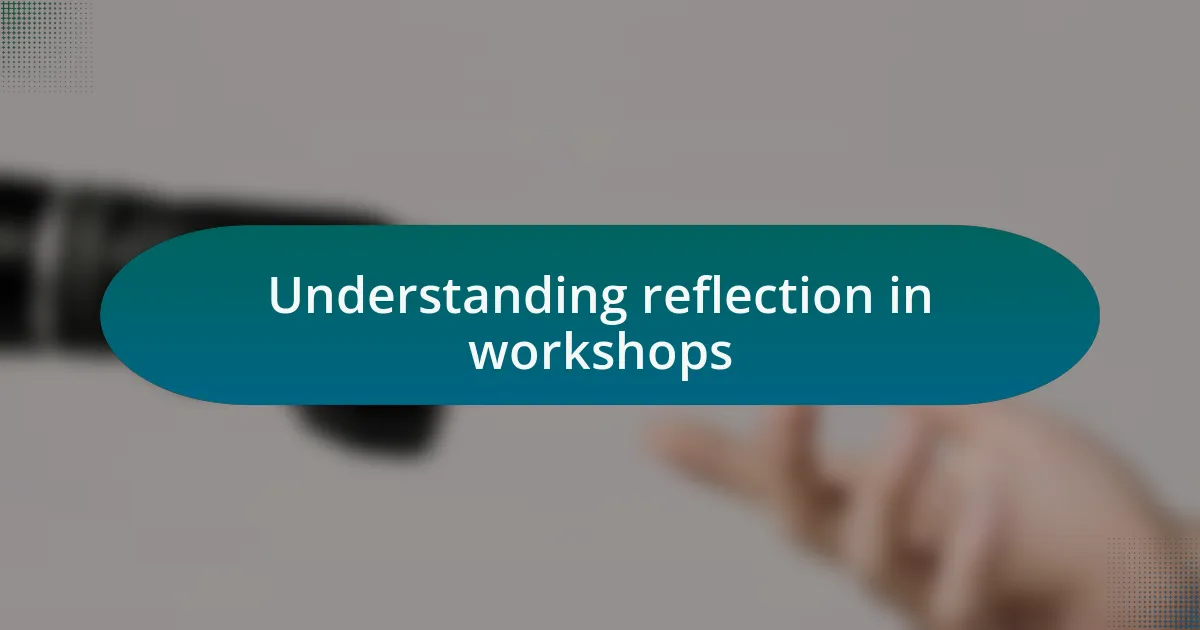
Understanding reflection in workshops
Reflection in workshops is more than just a buzzword; it’s a crucial process that allows participants to internalize their experiences. I’ve observed that when I guide attendees through reflective practices, they often express a deeper understanding of the material. For instance, during a recent tech workshop, I encouraged a group to share their thoughts on a particularly challenging session. The insights they offered not only sparked candid conversations but also revealed underlying assumptions that had hindered their learning.
Without failing to consider emotional responses, reflection often uncovers feelings that participants might not recognize initially. I recall a moment when a participant confessed that the feedback they received felt overwhelming. By reflecting on this, they could connect with their anxiety rather than suppressing it, leading to a more fruitful learning environment. Have you ever noticed how confronting our feelings can pave the way for breakthrough understanding?
Moreover, reflection creates space for personal growth. I often ask participants to share their reflections in small groups, and it’s fascinating to witness how their perspectives shift over a few minutes. One time, I noticed a skeptic transform into an advocate for the ideas presented simply by articulating their thoughts aloud. It’s these moments that underscore the power of reflection in workshops, fostering an atmosphere where everyone can benefit from shared experiences.
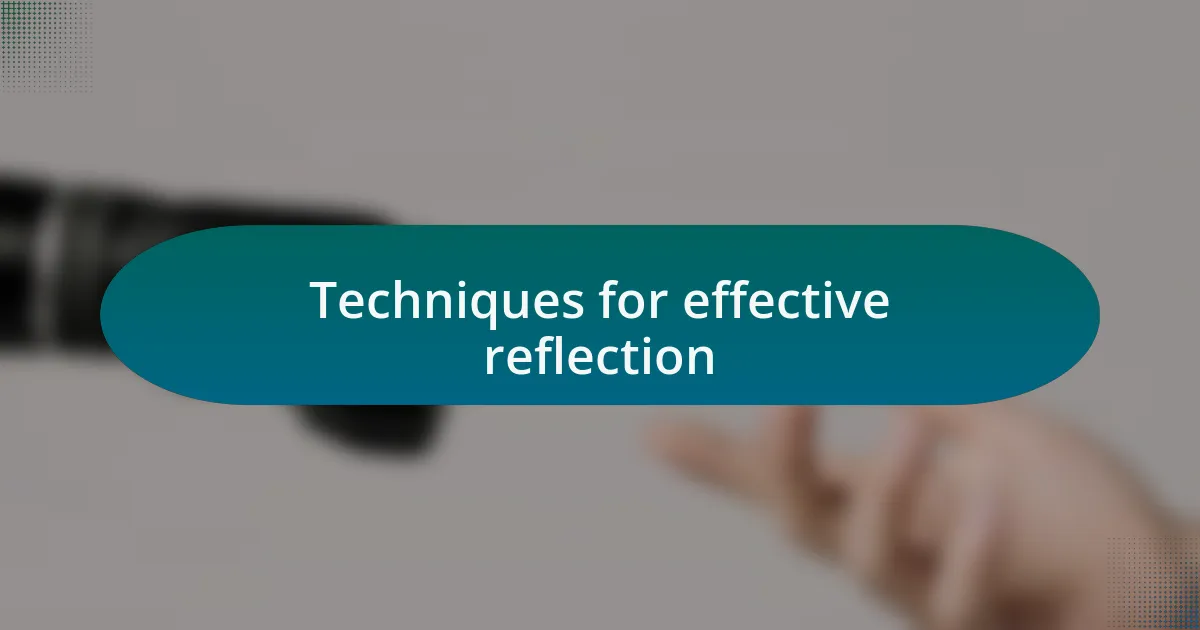
Techniques for effective reflection
Effective reflection can be enhanced through structured techniques. For example, I often utilize the “Three Good Things” exercise at the end of my workshops. Participants write down three insights or takeaways from the session. This technique not only reinforces learning but also shifts focus towards positive outcomes, inviting participants to dwell on what resonated with them. Have you ever noticed how highlighting the good can spark motivation for future learning?
Another technique I find invaluable is the use of guided questions. I usually ask participants to consider how they will apply what they’ve learned in their daily work. By framing reflection within a context of application, I see participants stretch their thoughts into actionable plans. One participant once shared how a simple question made them realize they could implement a new coding strategy immediately, which was truly rewarding to witness. What questions do you think could challenge your thinking in new ways?
In addition, I encourage the use of reflective journals throughout the workshop series. Participants jot down their thoughts and feelings in real-time, and it amazes me how this practice nurtures a sense of accountability. I’ve noticed that those who engage with their journals often return for follow-up sessions more prepared to share their journeys. I wonder if incorporating journaling in your own reflective processes could enhance your learning experience too?
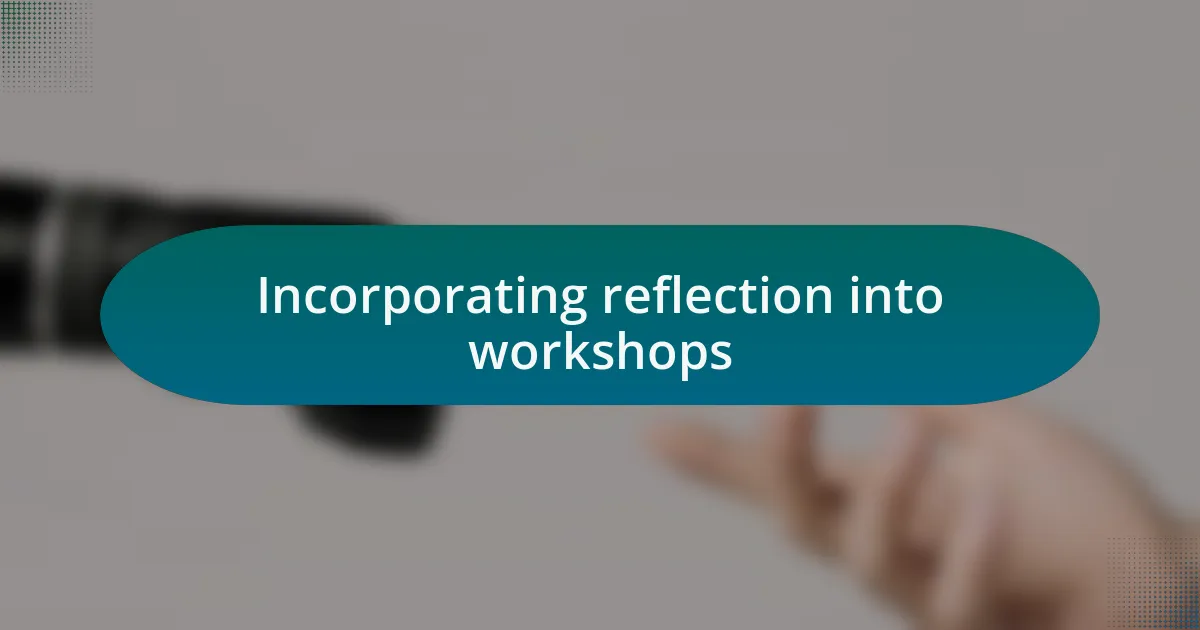
Incorporating reflection into workshops
Incorporating reflection into workshops can start with creating a safe space for sharing thoughts. I’ve often noticed that when I introduce a “Reflection Circle,” where participants can openly discuss their feelings and insights, the atmosphere changes significantly. Suddenly, participants feel more connected, and their reflections become deeper and more meaningful. Have you ever been part of a discussion that transformed your perspective entirely?
Another method I love is integrating role-playing scenarios that prompt participants to step outside themselves. In one workshop, we played out a situation where one had to give constructive feedback to a colleague. This exercise led to powerful reflections about communication styles and personal biases. Afterward, participants shared how they hadn’t just learned from the activity but had also reflected on their approaches in real-world interactions. Wouldn’t it be interesting to consider your own feedback style through role-play?
Additionally, I always reserve time at the end of my sessions for what I call “Silent Reflection.” Participants take a few minutes to themselves to process the workshop. I often hear that this quiet time is precious, allowing participants to connect the dots they might have missed in the moment. It’s a reminder that sometimes, reflection doesn’t need to be vocal; it just needs to be felt. How do you usually create space for reflection in your own work?
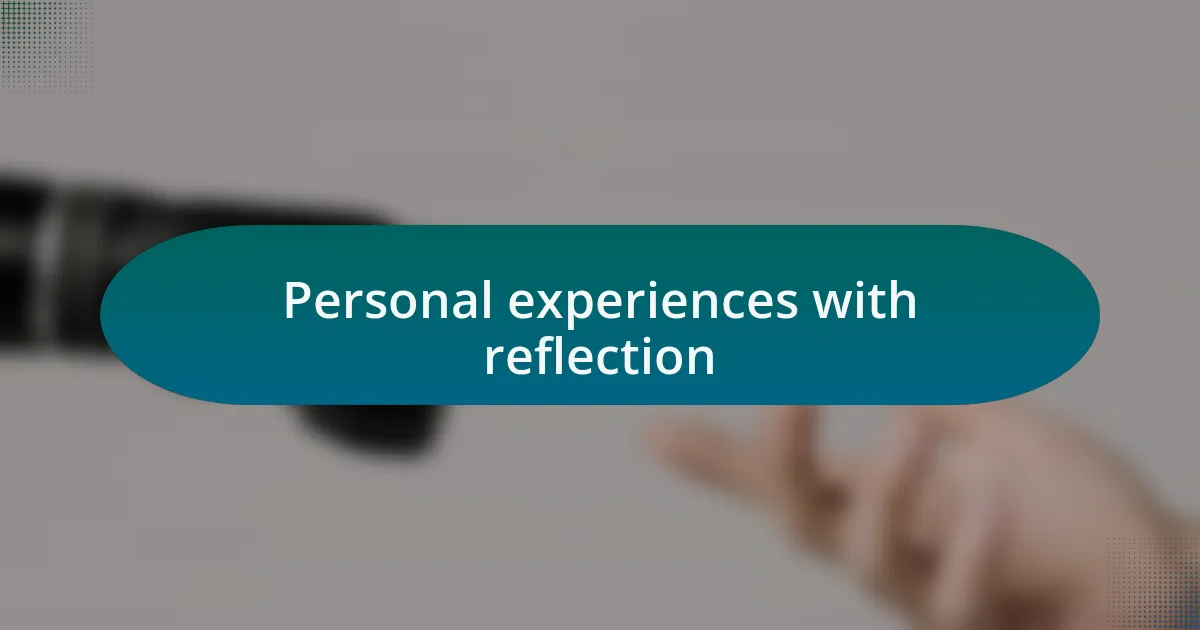
Personal experiences with reflection
In my earlier workshops, I realized the power of informal reflection over coffee breaks. I often find that participants open up more in these casual moments—sharing genuine thoughts that sometimes lead to the most enlightening discussions. Ever noticed how a relaxed atmosphere can bring out the best ideas?
Once, during a particularly intense session, I witnessed an unexpected moment of clarity. A participant, after reflecting on a challenging exercise, expressed how it changed her entire view on teamwork. That moment reminded me how important it is to allow space for personal insights; these revelations can significantly shift one’s mindset. Have you ever had a breakthrough like that in an unexpected moment?
Sometimes I incorporate journaling into my workshops as a way to deepen reflection. I encourage participants to write down their thoughts not just during but after the session. One time, a participant shared how writing helped her process emotions she had long ignored. That insight made me realize reflection is not just a tool for learning; it’s also a pathway for personal growth. How does journaling resonate with your reflective practices?
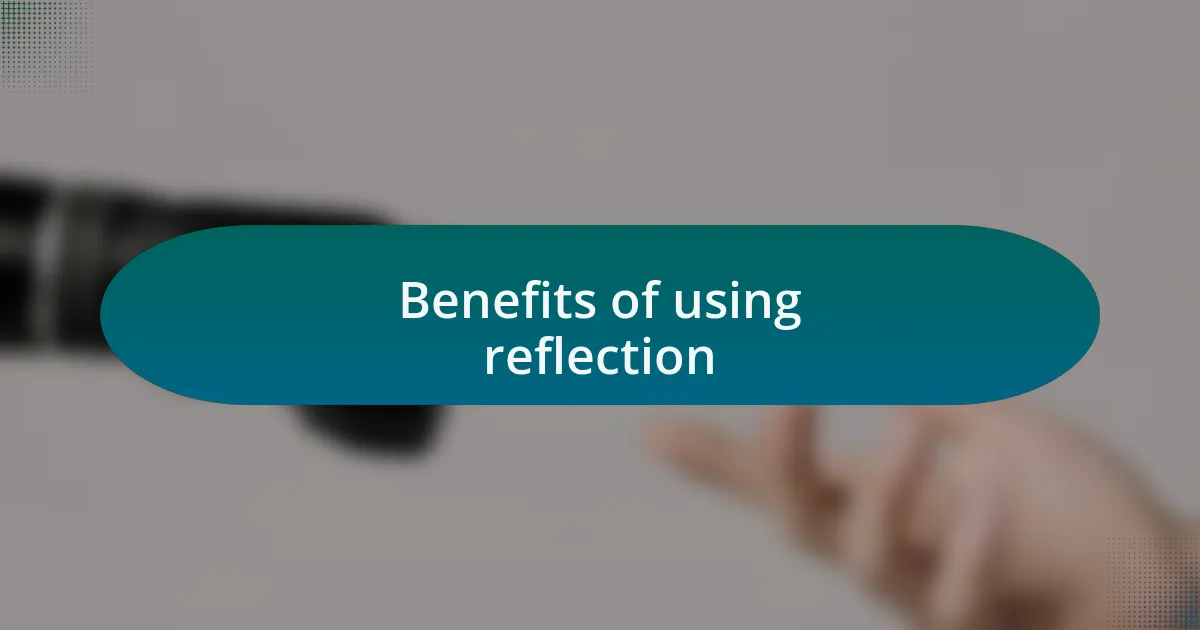
Benefits of using reflection
Using reflection in my workshops has been incredibly beneficial in several ways. For starters, it fosters a culture of openness among participants. I remember a workshop where we took a few minutes to reflect in silence after a particularly challenging discussion. The room was thick with introspection, and when we reconvened, everyone had insights to share that I hadn’t anticipated. Have you ever noticed how a pause can ignite deeper conversations?
Reflection also helps participants synthesize their learning in a meaningful way. I once facilitated a group where we revisited earlier discussions, and it was fascinating to see how their perspectives had evolved. One participant noted how reflecting on feedback transformed her approach to collaboration, inspiring her to actively seek diverse opinions. Isn’t it interesting how stepping back can lead to such profound realizations?
Moreover, embedding reflection into the workshop process cultivates lasting change. I often encourage follow-up reflections after our sessions, and the responses I receive are truly heartfelt. A participant once told me that revisiting his notes months later allowed him to connect the dots between various concepts. This not only reinforces learning but also sparks continuous growth. How do you think revisiting your experiences might catalyze your own development?
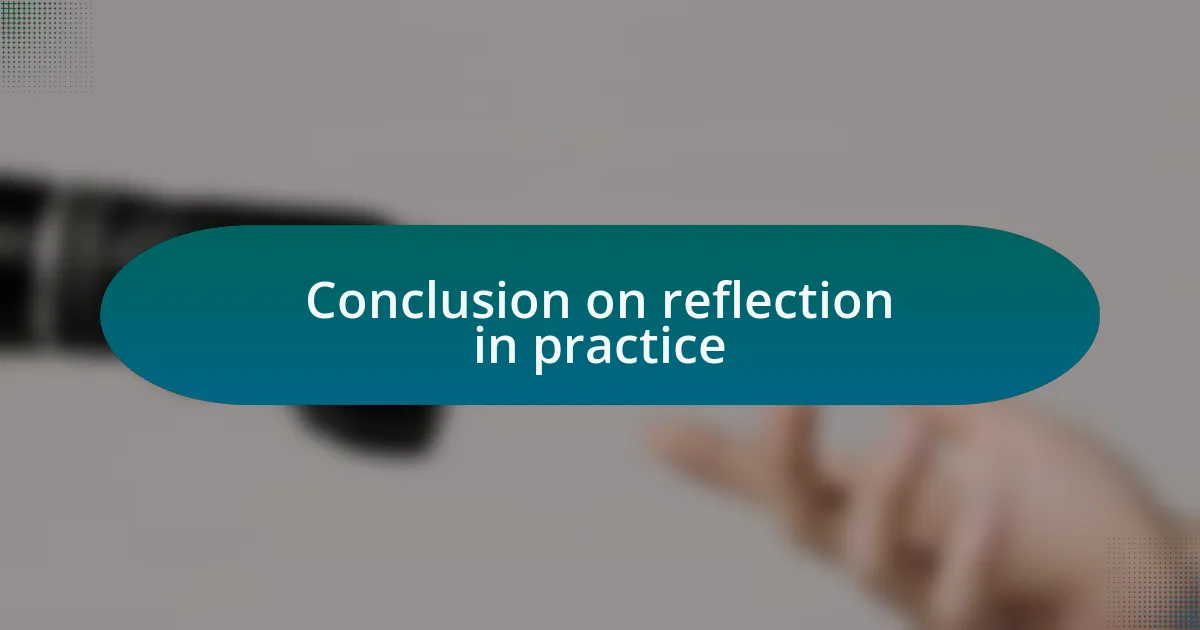
Conclusion on reflection in practice
Reflection in practice serves as a powerful tool for honing both individual and collective growth. During a recent workshop, I encouraged participants to journal their thoughts about the day’s events. Later, their ability to articulate their emotions and observations led to an unexpected bond among group members. Have you ever witnessed how sharing our reflections can weave a tighter community?
When I integrate reflection, it not only allows for personal insight but also creates a space for vulnerability and trust. I recall a moment when a participant opened up about how a past failure shaped her current mindset. That discussion shifted the atmosphere, allowing others to share their struggles and triumphs too. Doesn’t it make you wonder how the act of reflecting can transform a simple gathering into a supportive ecosystem?
Embedding reflection into my workshops reinforces the idea that learning is an ongoing journey rather than a destination. I often check in on how the insights gained from previous sessions resonate later on. It’s always rewarding to hear feedback that illustrates how a simple reflection question sparked a meaningful change in someone’s career trajectory. How might your own reflections influence your path forward?